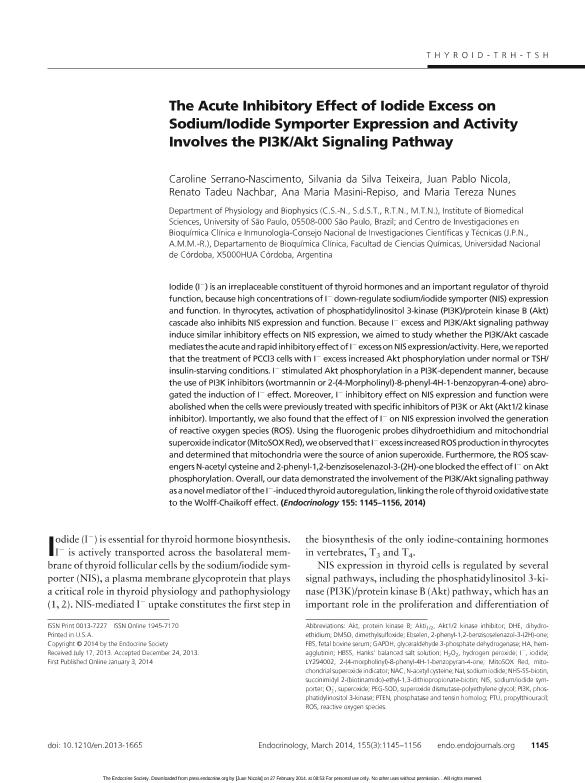Artículo
The Acute Inhibitory Effect of Iodide Excess on Sodium/Iodide Symporter Expression and Activity Involves the PI3K/Akt Signaling Pathway
Serrano Nascimento, Caroline; da Silva Teixeira, Silvania; Nicola, Juan Pablo ; Nachbar, Renato Tadeu; Masini, Ana María; Nunes, Maria Tereza
; Nachbar, Renato Tadeu; Masini, Ana María; Nunes, Maria Tereza
 ; Nachbar, Renato Tadeu; Masini, Ana María; Nunes, Maria Tereza
; Nachbar, Renato Tadeu; Masini, Ana María; Nunes, Maria Tereza
Fecha de publicación:
03/2014
Editorial:
Endocrine Society
Revista:
Endocrinology
ISSN:
0013-7227
Idioma:
Inglés
Tipo de recurso:
Artículo publicado
Clasificación temática:
Resumen
Iodide (I−) is an irreplaceable constituent of thyroid hormones and an important regulator of thyroid function, because high concentrations of I− down-regulate sodium/iodide symporter (NIS) expression and function. In thyrocytes, activation of phosphatidylinositol 3-kinase (PI3K)/protein kinase B (Akt) cascade also inhibits NIS expression and function. Because I− excess and PI3K/Akt signaling pathway induce similar inhibitory effects on NIS expression, we aimed to study whether the PI3K/Akt cascade mediates the acute and rapid inhibitory effect of I− excess on NIS expression/activity. Here, we reported that the treatment of PCCl3 cells with I− excess increased Akt phosphorylation under normal or TSH/insulin-starving conditions. I− stimulated Akt phosphorylation in a PI3K-dependent manner, because the use of PI3K inhibitors (wortmannin or 2-(4-Morpholinyl)-8-phenyl-4H-1-benzopyran-4-one) abrogated the induction of I− effect. Moreover, I− inhibitory effect on NIS expression and function were abolished when the cells were previously treated with specific inhibitors of PI3K or Akt (Akt1/2 kinase inhibitor). Importantly, we also found that the effect of I− on NIS expression involved the generation of reactive oxygen species (ROS). Using the fluorogenic probes dihydroethidium and mitochondrial superoxide indicator (MitoSOX Red), we observed that I− excess increased ROS production in thyrocytes and determined that mitochondria were the source of anion superoxide. Furthermore, the ROS scavengers N-acetyl cysteine and 2-phenyl-1,2-benzisoselenazol-3-(2H)-one blocked the effect of I− on Akt phosphorylation. Overall, our data demonstrated the involvement of the PI3K/Akt signaling pathway as a novel mediator of the I−-induced thyroid autoregulation, linking the role of thyroid oxidative state to the Wolff-Chaikoff effect.
Archivos asociados
Licencia
Identificadores
Colecciones
Articulos(CIBICI)
Articulos de CENTRO DE INV.EN BIOQUI.CLINICA E INMUNOLOGIA
Articulos de CENTRO DE INV.EN BIOQUI.CLINICA E INMUNOLOGIA
Citación
Serrano Nascimento, Caroline; da Silva Teixeira, Silvania; Nicola, Juan Pablo; Nachbar, Renato Tadeu; Masini, Ana María; et al.; The Acute Inhibitory Effect of Iodide Excess on Sodium/Iodide Symporter Expression and Activity Involves the PI3K/Akt Signaling Pathway; Endocrine Society; Endocrinology; 155; 3; 3-2014; 1145-1156
Compartir
Altmétricas



